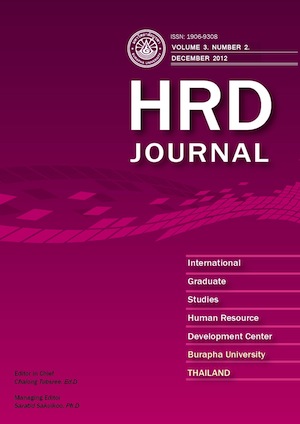Collective Violence Experience of Well-Adjusted Undergraduate Students Living in the Southern Border Provinces of Thailand: A Qualitative Investigation
Keywords:
Collective Violence, Students, Qualitative StudyAbstract
Collective violence continually breaks out in every corner of the world; Thailand is no exception. The violence in the Southern provinces that started in 2004 has been persistent for more than 8 years now, with critical incidents such as gunfire ambush, bomb planting, arson, assault, and various approaches to instigate riots. These fatally violent incidents have great impacts on individuals, families, and society. In order to advance understanding of the impact of the violent experience on the people’s well-being, this study examined the experience of collective violence among students native to the Southern border provinces of Thailand by means of a qualitative methodology. Key informants were 14 undergraduate students purposely sampled according to the set criteria. An interview format on collective-violence-related experience due to insurgencies was applied as an instrument. Data analysis employed a phenomenological qualitative method. Findings revealed four main themes: (1) violence assimilation through various news channels (family members, TV and newspapers in particular); (2) suffering and loss from insurgencies, including loss of mental stability (showing mental instability, paranoid, and panic), loss of beloved individuals and property (grieved, distressed, moved, angered, and quietly questioning), loss of freedom to live (limited or blocked freedom, discrimination by state officers, restricted travel), the family’s loss of subsistence income, and loss of education opportunity; (3) physical and mental adjustment to cope with surrounding incidents, including adjusting daily routines of studying and living (evacuation from and avoidance of traveling from the risk zone, safe choices of inhabitation, adapting schedules and modes of travel to fit the changing situation), coping with stress (emotional support from intimate persons, relaxation with interesting leisure activities, observation of religious teachings, and avoidance of daily violence input); and (4) transforming collective violence to personal growth and maturation (e.g., acceptance of the reality, positive attitude toward surrounding troubles, understanding, greater compassion to the family and others, and lessened prejudice and higher tolerance toward peers from other cultures). In sum, the findings demonstrated, not only desperate scenes of victimization through the uprising in the Southern border provinces of Thailand, but also the bright underlying tone of harmonious living in reality through happiness pursuits with mental strength, coping with difficulties, and letting go of sufferings, as the result of growth from fair and the noble seeds that are ready to become healthy and mature sprouts later on.
Keywords : Collective Violence, Students, Qualitative Study
Downloads
How to Cite
Issue
Section
License
Copyright@HRD Journal, Burapha University






